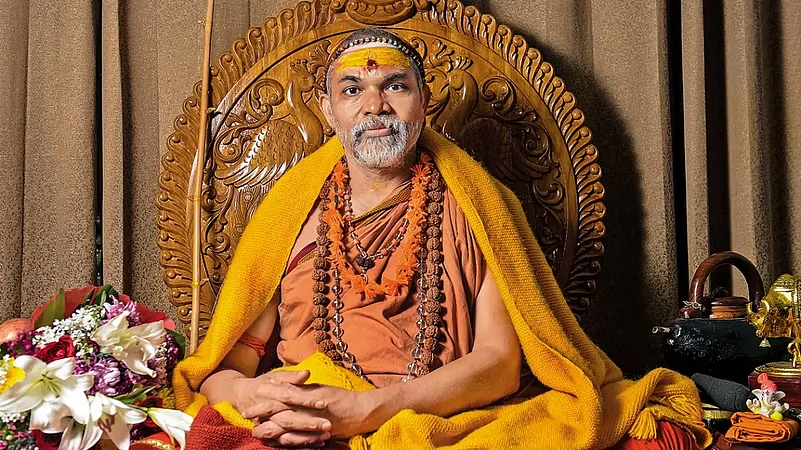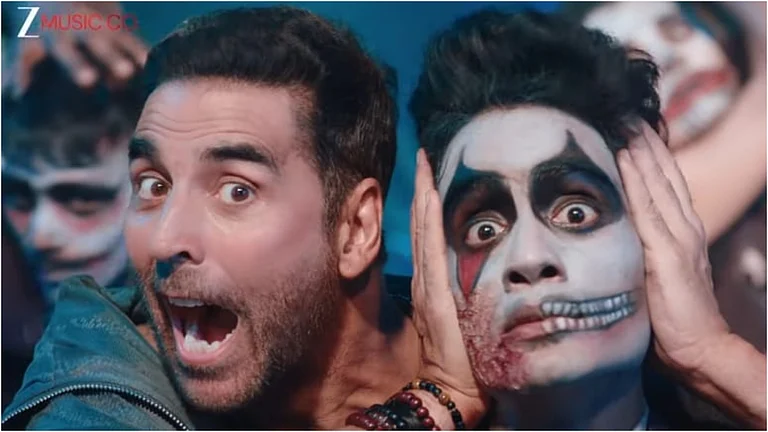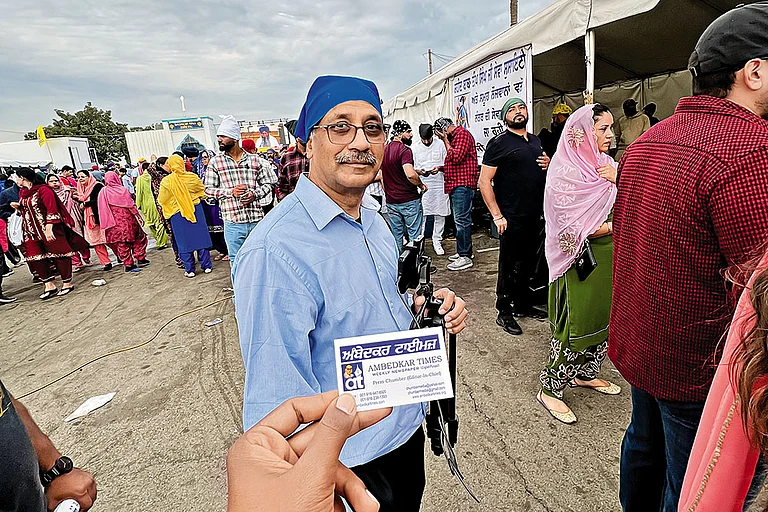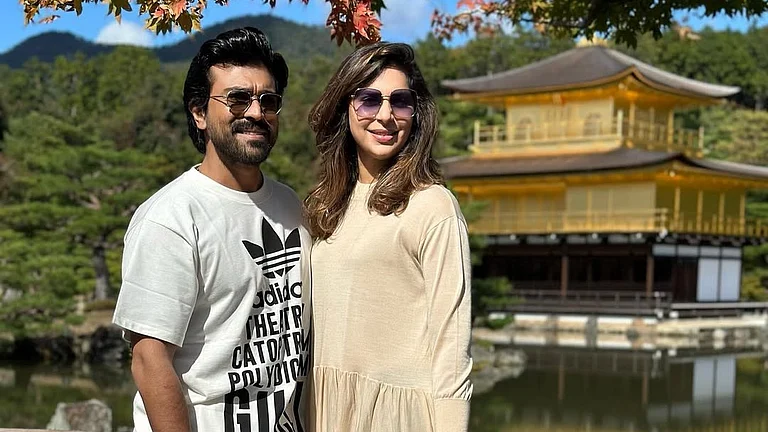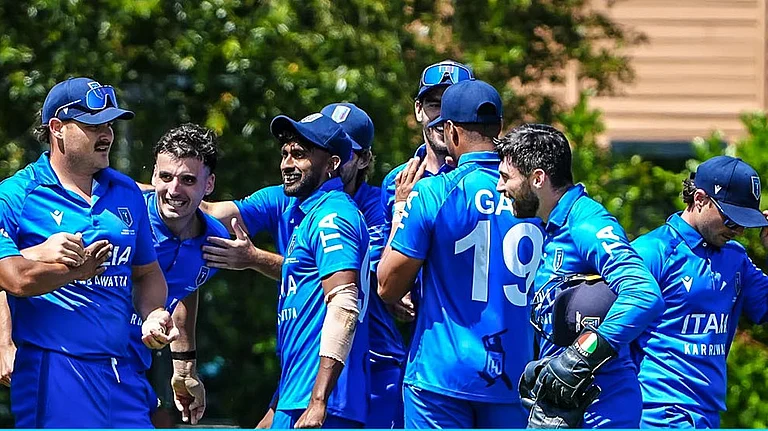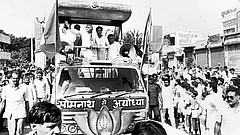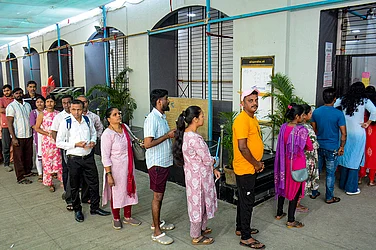Joshimath Shankaracharya Swami Avimukteshwaranand Saraswati, who came into the limelight for his decision to not attend the consecration ceremony at Ayodhya on January 22, in an exclusive interview with Outlook's Abhik Bhattacharya, says that the religious scriptures are not being followed. He also accuses the Shri Ram Janmabhoomi Teerth Kshetra Trust secretary, Champat Rai, of dividing Hindu society in the name of sects. Excerpts:
Why did you decide to not attend the consecration ceremony of Ram Mandir?
The post of Shankaracharya comes with some duties and responsibilities. On the one hand, we are bound to support any legitimate effort of Sanatanis, and on the other, we must stop if anything irreligious is happening. As we found that the Pran Pratistha of lord Ram is happening in a religiously non-conducive environment, we had to come out in front of the media to share our thoughts.
As per Hindu scriptures, we don’t think of Pran Pratistha only when we have the land; we rather think of laying the stone. After that, we consider building walls and the dome. Then only, we start thinking of Pran Pratistha. When the temple is itself incomplete, how can they do Pran Pratistha? According to our scriptures, the temple is the body of God. The spire of the temple is the eyes and the dome is the head. Neither the eyes nor the head is ready. How can you do the rituals in the sanctum sanctorum?
The person responsible for fixing the auspicious moment, in his response, compared it to an apartment where the foundation of the ground floor is considered to be enough for settlement. But it is your residential home, and the rituals of a temple are definitely different. The scripture also says that disobeying this path can harm the people who are connected to it. And here the whole country is invested in it. So, it will definitely affect the prosperity of the country.
We came to know from a few saints who are connected to the construction of the temple that Ram has been there for millennia. So, it is just a ritual of opening the gate of the temple. How do you read it?
If Ram has been there for aeons, why are they using the word Pratistha? Let them use some different words and we would not say anything. You are fixing the auspicious moment; you are calling saints for the rituals and then you are claiming it is not Pratistha. How does it make sense?
India is a secular state. Still, when ministers take oath, neither can they alter any word nor can they read out something else. The Governors and the President make sure that they read out exactly what is written. Everything in this society has some accepted norms.
If a minister can’t take up his/her job unless he/she follows proper procedure, how is the installation of our God possible without following the right course?
Why do you think they are rushing to hold the consecration ceremony?
People are telling me that Lok Sabha polls are very near and they want to do it before the elections. Primarily, I didn’t endorse it. When I expressed my opinion, a few people told me that Maharaj ji, please let it happen because if Modi loses the election and any other party comes to power, they will stop its construction. But how should I perceive such narratives? Our Supreme Court has given the verdict following which the temple is being built. How can a party stall it?
Champat Rai, the general secretary of the Shri Ram Janmabhoomi Teerth Kshetra Trust, has said that it is a matter of the Ramanand sect and thus Shankaracharyas who follow the Shakta tradition are keeping themselves out of it.
Firstly, the trust should tell us whether they believe that Hindu society is divided—whether the people following Shakta, Shaivite tradition would not be allowed to go and visit the Mandir. Is it not their temple? Even after giving such divisive statements, how can he continue to hold his post? How can the PM be silent?
Secondly, if the place is of Ramanandis, how can he sit there? He is not one of them. Thirdly, if it is a place of Ramanandis where Shankaracharyas don’t have anything to do, why didn’t they invite Jagadguru Ramanandacharya Swami Ramnareshacharya Maharaj who is not only the head of the Ramanand sect, but also had massively contributed towards building the temple?
Not only that, as I called Swami Shivramacharya ji Maharaj, who was the head of the Ram Janmabhoomi Nyas, and under whose leadership the movement was built up, I got to know that he was not even invited. Earlier, they said that it is not a Ram temple, it is the temple of the country. We believed in it and hoped that there would be no division and everybody would be equally included. People across the country contributed to the cause. Whatever minimum they had, they gave it for the temple. And you are saying that it is for a specific community?
The PM will do Pran Pratistha at the sanctum sanctorum. As per the scriptures, is it allowed? What should be the right time for Pran Pratistha?
According to the rules, the king as the representative of the people can do it. He goes through the coronation process and has some power vested in him. In a democracy, there is no king. An elected representative cannot be considered as king. He is the Prime Minister, not even the President. In fact, the President was invited later, whereas she should have been the first person to receive the invite.
In a secular country, elected representatives can take two paths. Either they can excuse themselves from any religious programmes or they may equally attend all of them. He may do the rituals, but he must follow the diktats of Dharmashastra. If you do the religious works, you must follow the rituals mentioned in the scriptures.
MORE FROM THIS ISSUE
Ram lalla is going to be re-installed at his birthplace. So, the most auspicious moment would have been Rama Navami—his birthday. But perhaps there is more to it behind choosing the auspicious moment that lies beyond our comprehension.







